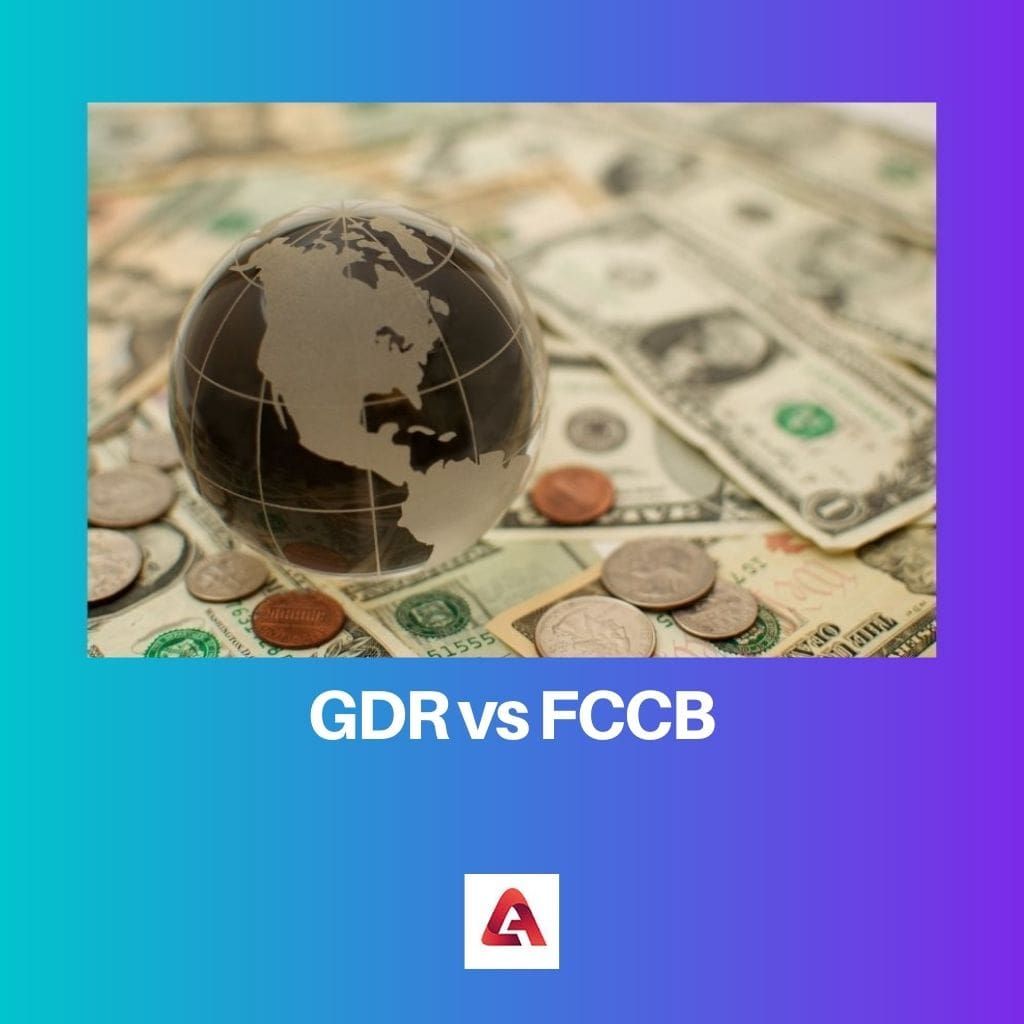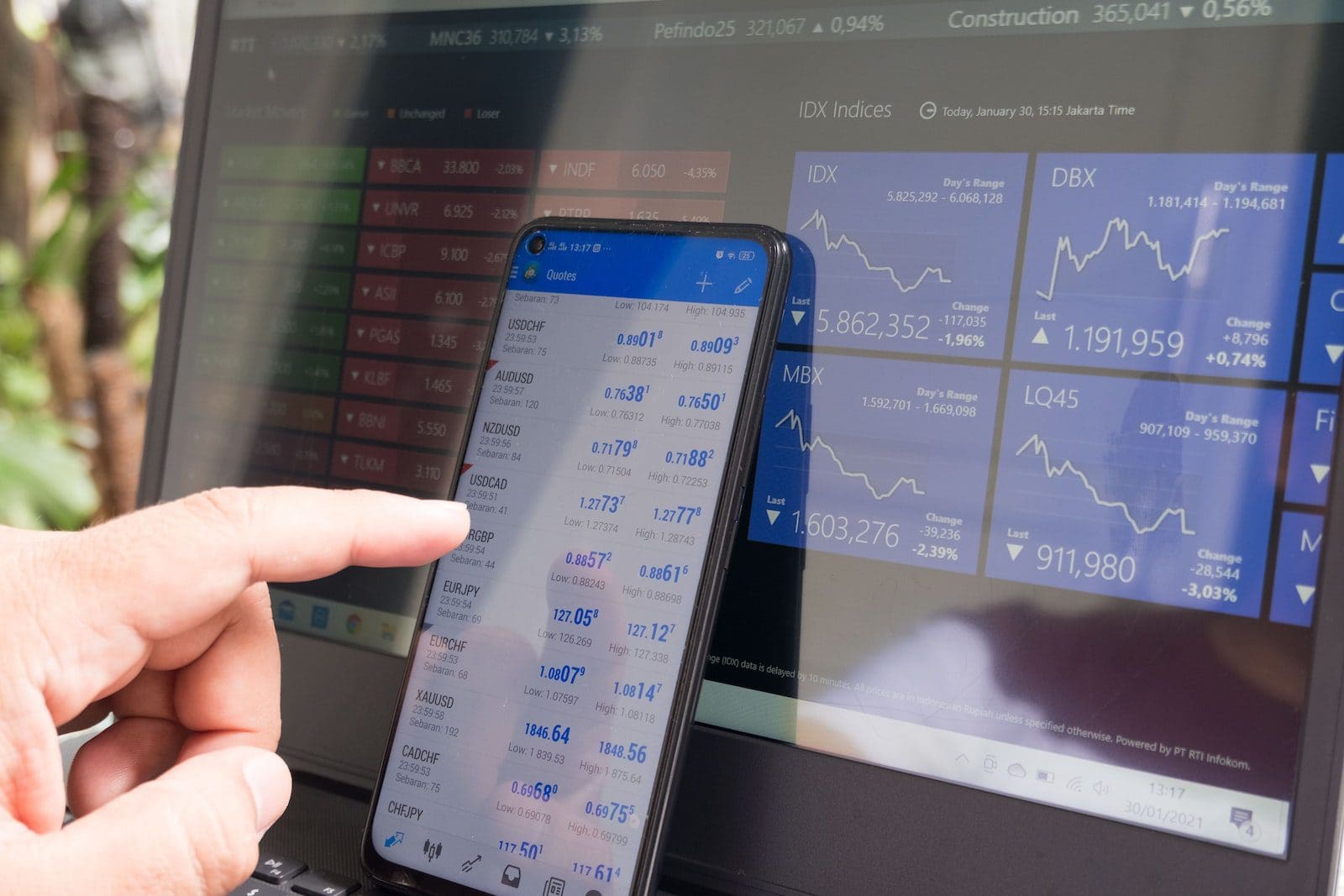GDRs (Global Depositary Receipts) represent shares of a foreign company traded on international markets, enabling global investment. FCCBs (Foreign Currency Convertible Bonds) are debt instruments issued by foreign companies, convertible into equity shares, offering potential upside through conversion and fixed income through bond features. GDRs offer direct equity ownership, while FCCBs provide a hybrid of debt and equity exposure with potential dilution upon conversion.
Key Takeaways
- Global Depository Receipts (GDRs) are certificates issued by banks representing foreign company shares, allowing investors to trade these shares in multiple markets.
- Foreign Currency Convertible Bonds (FCCBs) are debt securities that can be converted into a predetermined number of shares in the issuing company or redeemed for cash.
- GDRs offer equity exposure, while FCCBs offer debt and equity exposure with the potential for capital gains through conversion.
GDR vs FCCB
The difference between GDR and FCCB is that GDR is an equity instrument in the form of Depository Receipts created by the Overseas Depository Bank outside the domestic country and issued to foreign investors. Whereas FCCBs are convertible debt instruments that help companies raise funds in foreign countries by issuing currencies different from the issuer’s home country.

Comparison Table
| Feature | GDR (Global Depository Receipt) | FCCB (Foreign Currency Convertible Bond) |
|---|---|---|
| Purpose | Raise capital from international investors | Raise foreign currency from foreign investors |
| Underlying Asset | Shares of a company listed on a domestic stock exchange | Debt instrument issued by a company, convertible into shares at a predetermined price and time |
| Trading Location | Listed and traded on a stock exchange outside the issuer’s home country | Primarily traded over-the-counter (OTC) market |
| Regulation | Subject to regulations of the issuing company’s home country and the listing exchange | Subject to regulations of the issuing company’s home country and specific regulations for FCCBs |
| Investor benefits | Access to foreign companies, diversification, potentially higher returns | Exposure to a specific company in a preferred currency, potential for capital appreciation through conversion |
| Issuer benefits | Access to foreign capital, improved liquidity, potential for higher valuation | Raise funds in a foreign currency, potentially lower interest rates compared to domestic borrowings |
| Risks for Investors | Currency fluctuations, political and economic risks in the issuer’s country, potential for illiquidity | Credit risk of the issuer, potential for dilution upon conversion, risk of not converting if the stock price doesn’t reach the conversion price |
| Risks for Issuers | Currency fluctuations, potential for loss of control if GDRs hold a significant portion of voting rights | Debt obligation, potential for currency depreciation increasing repayment costs |
What is GDR?
Introduction to GDRs
Global Depositary Receipts (GDRs) are financial instruments that represent ownership of shares in a foreign company. They facilitate investment in foreign companies by enabling them to be traded on international stock exchanges. GDRs are typically denominated in a currency other than that of the company’s home country, making them accessible to investors worldwide.
Structure and Mechanism
GDRs are created when a foreign company deposits its shares with a depositary bank, typically in a country with a robust financial market such as the United States or the United Kingdom. The depositary bank then issues GDRs, each representing a specific number of underlying shares of the foreign company. These GDRs are then traded on international stock exchanges like any other security, allowing investors to buy and sell them freely.
Benefits and Advantages
GDRs offer several benefits to both issuers and investors. For issuers, GDRs provide access to a broader investor base and increased liquidity by tapping into international capital markets. This can help foreign companies raise capital more efficiently and at potentially lower costs compared to domestic markets. Additionally, GDRs enhance visibility and credibility for the issuing company on a global scale.
For investors, GDRs offer the opportunity to diversify their portfolios by gaining exposure to foreign markets and companies. They also provide a convenient way to invest in foreign companies without the need to navigate complex foreign exchange processes or regulatory requirements. Furthermore, GDRs often come with investor protections and corporate governance standards, providing a level of assurance to investors.

What is FCCB?
Introduction to FCCBs
Foreign Currency Convertible Bonds (FCCBs) are financial instruments issued by companies in a currency different from their home currency, typically in the form of bonds. These bonds offer investors the option to convert them into equity shares of the issuing company at a predetermined conversion price during or at the end of the bond’s maturity period. FCCBs provide companies with an alternative means of raising capital while offering investors the potential for capital appreciation through equity conversion.
Structure and Mechanism
FCCBs are structured as bonds with a fixed maturity date, typically ranging from five to seven years. They carry a coupon rate, which is the interest paid to bondholders at regular intervals until maturity. One of the key features of FCCBs is their convertibility option, allowing bondholders to convert the bonds into a predetermined number of equity shares of the issuing company.
The conversion price, set at the time of issuance, determines the rate at which FCCBs can be converted into equity shares. This price is usually set at a premium to the prevailing market price of the company’s shares at the time of issuance. If the market price of the company’s shares rises above the conversion price, bondholders may choose to convert their bonds into equity, potentially realizing capital gains.
Benefits and Advantages
FCCBs offer several benefits to both issuers and investors. For companies, FCCBs provide access to capital from international markets, often at lower interest rates compared to domestic debt instruments. Additionally, the convertibility feature of FCCBs can act as a hedge against currency risk, as the bonds are denominated in a foreign currency.
For investors, FCCBs offer the potential for capital appreciation through equity conversion, providing an opportunity to participate in the growth of the issuing company. Furthermore, FCCBs offer diversification benefits, as they allow investors to gain exposure to foreign companies and currencies. Additionally, bondholders receive fixed interest payments throughout the bond’s tenure, providing a source of income.

Main Differences Between GDR and FCCB
- Here are the main differences between GDRs (Global Depositary Receipts) and FCCBs (Foreign Currency Convertible Bonds) in a bullet-point list:
- Nature of Instrument:
- GDRs represent ownership of shares in a foreign company and are traded on international stock exchanges.
- FCCBs are debt instruments issued by companies in a foreign currency, offering the option to convert into equity shares of the issuing company.
- Conversion Mechanism:
- GDRs do not have a conversion feature; they represent direct equity ownership and do not involve conversion into shares.
- FCCBs come with a conversion option, allowing bondholders to convert their bonds into a predetermined number of equity shares of the issuing company.
- Interest vs. Dividends:
- GDR holders typically receive dividends if the issuing company distributes them to its shareholders.
- FCCB holders receive fixed interest payments throughout the bond’s tenure, regardless of the issuing company’s dividend policy.
- Risk and Return Profile:
- GDRs offer potential returns through capital appreciation of the underlying shares and dividends but carry market risk associated with equity investments.
- FCCBs offer fixed income through interest payments and the potential for capital appreciation through equity conversion, with risks including credit risk and currency risk.
- Regulatory Framework:
- GDRs are subject to the regulatory framework of the countries where they are listed and traded, as well as the regulations governing cross-border securities transactions.
- FCCBs are subject to regulatory requirements related to bond issuance and conversion, as well as foreign exchange regulations governing cross-border capital flows.
- Liquidity and Trading:
- GDRs are traded on international stock exchanges, providing liquidity to investors through active trading markets.
- FCCBs may have less liquidity compared to GDRs as they are traded over-the-counter or on specific bond markets, which may limit trading opportunities.
- Purpose and Use:
- GDRs are primarily used by foreign companies to access international capital markets and by investors to gain exposure to foreign companies and markets.
- FCCBs are used by companies to raise capital from international investors while offering investors the potential for equity participation and fixed income.

- https://papers.ssrn.com/sol3/papers.cfm?abstract_id=1751461
- https://papers.ssrn.com/sol3/papers.cfm?abstract_id=928396

Interesting comparison of GDRs and FCCBs. The content provides a nuanced understanding of these investment options, crucial for making informed decisions when accessing global markets.
Absolutely, Tracy. The article delivers detailed insights into the potential risks and rewards of international investing, essential for investors to approach the global market with clarity and caution.
Very true, Tracy. The breakdown offers a clear understanding of the complexities of global investment instruments, equipping investors to navigate international markets thoughtfully.
A very comprehensive breakdown of the differences between GDR and FCCB. It explains why such investment opportunities are so important in the modern world, with both risks and benefits to consider.
That’s right, Graham. GDRs and FCCBs offer different ways for investors to capitalize on the global market. It’s crucial to be informed of their advantages and disadvantages before diving in.
The information on GDRs and FCCBs is comprehensive, offering a sophisticated understanding of international investment opportunities and the associated risks.
Indeed, Sally. The article evaluates the nuances of GDRs and FCCBs, providing investors with an insightful perspective on international investment instruments.
An illuminating perspective on GDRs and FCCBs, providing investors with the essential information required to make informed decisions regarding international investment opportunities.
Absolutely, John. The detailed analysis of these investment instruments offers a comprehensive understanding of the risks and returns associated with investing in the global market.
This article offers a detailed comparison of GDRs and FCCBs, crucial for investors looking to expand their portfolios across different nations. It provides valuable insights for global investment decisions.
Spot on, Tlloyd. This analysis is essential for investors to navigate the complexities of international investment instruments and make informed decisions in the global market.
A thought-provoking analysis of GDRs and FCCBs, articulating the potential benefits and pitfalls of investing in multiple markets across the globe.
Absolutely, Alan. This content elucidates the complexity of global investments, offering investors a comprehensive grasp of the challenges and opportunities associated with international investment instruments.
A clear, concise comparison of GDRs and FCCBs, with specific advantages and disadvantages for each. It’s educational for anyone looking to diversify their investments across the globe.
Couldn’t agree more, Bailey. The insights provided here are essential for investors to grasp the potential risks and opportunities associated with investing in foreign markets.
Definitely, Andrew. This article underlines the complexities and benefits of these investment instruments, vital for individuals to consider before making global investment decisions.
This article provides an excellent overview of the advantages and disadvantages of GDRs and how they compare to FCCBs. It’s invaluable information for any investor looking to expand their portfolio internationally.
Absolutely, Roxanne. This content will surely help potential investors make more informed decisions before venturing into foreign markets.
Very true. Understanding the risks and potential gains of international investing, especially with instruments like GDRs and FCCBs, is crucial for long-term success in the global market.
The breakdown of GDRs and FCCBs is enlightening, shedding light on the intricate details of global investing. It’s a wake-up call for those unaware of the potential risks involved.
Absolutely, Yasmine. The article offers a comprehensive understanding of these financial instruments and the global economic landscape, essential for investors to navigate intelligently.
Well said, Davis. These insights are invaluable for those looking to explore opportunities in emerging markets and avoid the pitfalls associated with international investment.
This article provides a detailed comparison of GDRs and FCCBs, highlighting the advantages and disadvantages of each. It’s certainly a compelling read for investors venturing into international markets.